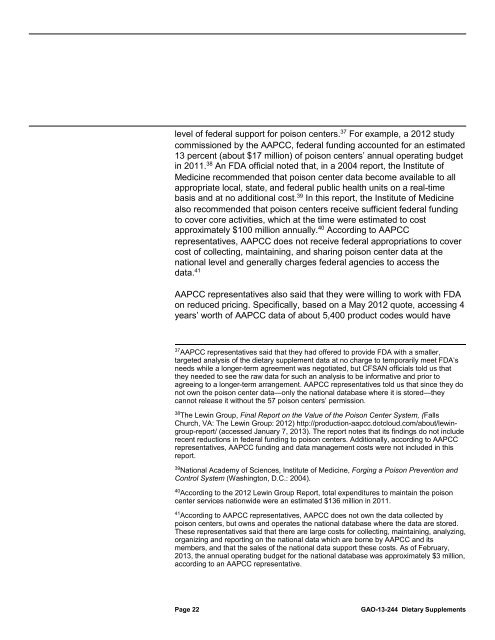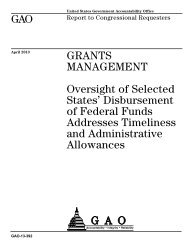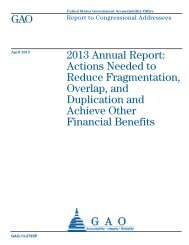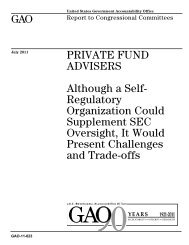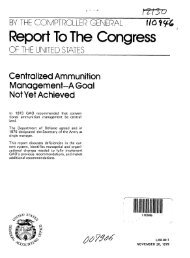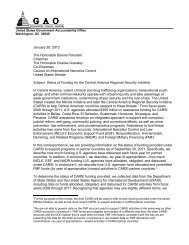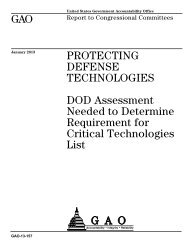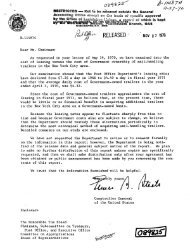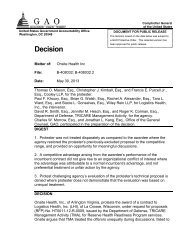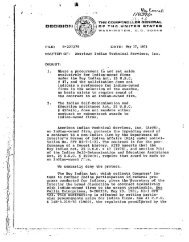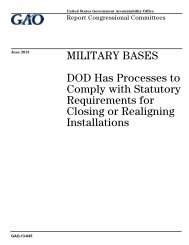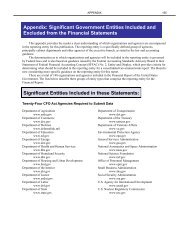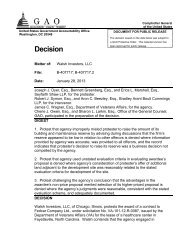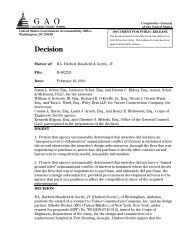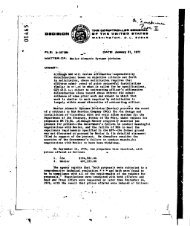Dietary supplements: FDA may have opportunities to expand its use
Dietary supplements: FDA may have opportunities to expand its use
Dietary supplements: FDA may have opportunities to expand its use
Create successful ePaper yourself
Turn your PDF publications into a flip-book with our unique Google optimized e-Paper software.
level of federal support for poison centers. 37 For example, a 2012 study<br />
commissioned by the AAPCC, federal funding accounted for an estimated<br />
13 percent (about $17 million) of poison centers’ annual operating budget<br />
in 2011. 38 An <strong>FDA</strong> official noted that, in a 2004 report, the Institute of<br />
Medicine recommended that poison center data become available <strong>to</strong> all<br />
appropriate local, state, and federal public health un<strong>its</strong> on a real-time<br />
basis and at no additional cost. 39 In this report, the Institute of Medicine<br />
also recommended that poison centers receive sufficient federal funding<br />
<strong>to</strong> cover core activities, which at the time were estimated <strong>to</strong> cost<br />
approximately $100 million annually. 40 According <strong>to</strong> AAPCC<br />
representatives, AAPCC does not receive federal appropriations <strong>to</strong> cover<br />
cost of collecting, maintaining, and sharing poison center data at the<br />
national level and generally charges federal agencies <strong>to</strong> access the<br />
data. 41<br />
AAPCC representatives also said that they were willing <strong>to</strong> work with <strong>FDA</strong><br />
on reduced pricing. Specifically, based on a May 2012 quote, accessing 4<br />
years’ worth of AAPCC data of about 5,400 product codes would <strong>have</strong><br />
37 AAPCC representatives said that they had offered <strong>to</strong> provide <strong>FDA</strong> with a smaller,<br />
targeted analysis of the dietary supplement data at no charge <strong>to</strong> temporarily meet <strong>FDA</strong>’s<br />
needs while a longer-term agreement was negotiated, but CFSAN officials <strong>to</strong>ld us that<br />
they needed <strong>to</strong> see the raw data for such an analysis <strong>to</strong> be informative and prior <strong>to</strong><br />
agreeing <strong>to</strong> a longer-term arrangement. AAPCC representatives <strong>to</strong>ld us that since they do<br />
not own the poison center data—only the national database where it is s<strong>to</strong>red—they<br />
cannot release it without the 57 poison centers’ permission.<br />
38 The Lewin Group, Final Report on the Value of the Poison Center System, (Falls<br />
Church, VA: The Lewin Group: 2012) http://production-aapcc.dotcloud.com/about/lewingroup-report/<br />
(accessed January 7, 2013). The report notes that <strong>its</strong> findings do not include<br />
recent reductions in federal funding <strong>to</strong> poison centers. Additionally, according <strong>to</strong> AAPCC<br />
representatives, AAPCC funding and data management costs were not included in this<br />
report.<br />
39 National Academy of Sciences, Institute of Medicine, Forging a Poison Prevention and<br />
Control System (Washing<strong>to</strong>n, D.C.: 2004).<br />
40 According <strong>to</strong> the 2012 Lewin Group Report, <strong>to</strong>tal expenditures <strong>to</strong> maintain the poison<br />
center services nationwide were an estimated $136 million in 2011.<br />
41 According <strong>to</strong> AAPCC representatives, AAPCC does not own the data collected by<br />
poison centers, but owns and operates the national database where the data are s<strong>to</strong>red.<br />
These representatives said that there are large costs for collecting, maintaining, analyzing,<br />
organizing and reporting on the national data which are borne by AAPCC and <strong>its</strong><br />
members, and that the sales of the national data support these costs. As of February,<br />
2013, the annual operating budget for the national database was approximately $3 million,<br />
according <strong>to</strong> an AAPCC representative.<br />
Page 22<br />
GAO-13-244 <strong>Dietary</strong> Supplements


